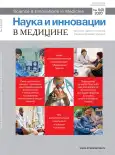Gender specificity in the interpretation of treatment results for patients with colorectal cancer in the Republic of Tatarstan
- Authors: Gataullin B.I.1,2, Khasanov R.S.1, Savelev A.A.3, Gataullin I.G.1
-
Affiliations:
- Kazan State Medical Academy – Branch of the Russian Medical Academy of Continuous Professional Education
- Republican Clinical Oncological Dispensary
- Kazan (Volga Region) Federal University
- Issue: Vol 5, No 2 (2020)
- Pages: 124-129
- Section: Oncology
- URL: https://bakhtiniada.ru/2500-1388/article/view/43802
- DOI: https://doi.org/10.35693/2500-1388-2020-5-2-124-129
- ID: 43802
Cite item
Full Text
Abstract
Objective – to identify the gender-specific features of modeling the prognosis of treatment outcomes for patients with colorectal cancer (CRC).
Materials and methods. The study included 654 patients with colorectal cancer (CRC) who were treated from 2013 to 2015, of which 434 were men, 220 were women. The average age of the patients was 64.1±10.2 years. All patients underwent genetic analysis for the presence of a mutation in the KRAS gene from the primary tumor.
Results. The gender approach to assessing the long-term results of treatment of patients with CRC showed that in men with colorectal cancer, the most favorable treatment results were observed in patients with tumors in stage T 1-2 N0 M0, regardless of the differentiation of the tumor and its mutational status. In men, poorly differentiated tumors with any T, with the presence of regional metastases and a mutation of the KRAS gene, even in the absence of distant metastases, should be considered prognostically unfavorable: not a single patient lived for 5 years. In women, based on the decision tree analysis, the most favorable treatment results were observed in patients with tumors in the stage T 1-2-3 N0 M0 under the age of 70 years (five-year survival rate of 90%), with tumors T 1-2 N0 M0 – over the age of 70 years (five-year survival of 81.8%), regardless of the differentiation of the tumor and its mutational status. Tumors of any differentiation of the T3-4 N0 stage with the presence of distant metastases (5% of patients lived for 5 years) and poorly differentiated T4N0M0 tumors (five-year survival of 8%) are prognostically unfavorable for women.
Conclusion. The study of gender and age-related features of the development and course of CRC is relevant for oncologists to select effective diagnostic, therapeutic and rehabilitation measures.
Full Text
##article.viewOnOriginalSite##About the authors
Bulat I. Gataullin
Kazan State Medical Academy – Branch of the Russian Medical Academy of Continuous Professional Education; Republican Clinical Oncological Dispensary
Author for correspondence.
Email: bulatg@list.ru
ORCID iD: 0000-0003-1695-168X
assistant of the Department of Oncology, Radiology and Palliative Care, oncologist
Russian Federation, KazanRustem Sh. Khasanov
Kazan State Medical Academy – Branch of the Russian Medical Academy of Continuous Professional Education
Email: bulatg@list.ru
SPIN-code: 9198-5889
Scopus Author ID: 583867
PhD, Professor, Corresponding Member RAS, Head of the Department of Oncology, Radiology and Palliative Care
Russian Federation, KazanAnatolii A. Savelev
Kazan (Volga Region) Federal University
Email: bulatg@list.ru
ORCID iD: 0000-0002-6270-7744
Cand. Sc. Physics and Mathematics, D.Sc. Biology, Professor, Department of Environmental systems modeling of the Institute of Ecology and Natural Resources Management
Russian Federation, KazanIlgiz G. Gataullin
Kazan State Medical Academy – Branch of the Russian Medical Academy of Continuous Professional Education
Email: bulatg@list.ru
ORCID iD: 0000-0001-5115-6388
PhD, Professor of the Department of Oncology, Radiology and Palliative Care
Russian Federation, KazanReferences
- Global Cancer Statistics 2018: GLOBOCAN Estimates of Incidence and Mortality Worldwide for 36 Cancers in 185 Countries. (In Russ.). [Cтатистика по раку за 2018 г. ГЛОБОКАН. Оценки заболеваемости и смертности во всем мире по 36 видам рака в 185 странах]. doi: 10.33 22/caac.21492
- Kaprin AD. State of cancer care for the population of Russia in 2018. Russian center for information technologies and epidemiological research in oncology. (In Russ.). [Каприн А.Д. Состояние онкологической помощи населению России в 2018 году. Российский центр информационных технологий и эпидемиологических исследований в области онкологии].
- Kim SE, Paik HY, Yoon H, et al. Sex- and gender-specific disparities in colorectal cancer risk. World J Gastroenterol. 2015:21(17):5167–75. doi: 10.3748/wjg.v21. i17.5167
- Zharkova OS, Sharopin KA, Seidova AS, et al. Building decision support systems in medicine based on a decision tree. Modern science-intensive technologies. 2016;6–1:33–37. (In Russ.). [Жаркова О.С., Шаропин К.А., Сеидова А.С. и др. Построение систем поддержки принятия решений в медицине на основе дерева решений. Современные наукоемкие технологии. 2016;6–1:33–37]. doi: 10.17513/snt.37918
- Smagulova KK, Kaidarova DR, Chichua NA, Ishkinin EI. Study of the frequency and spectrum of KRAS gene mutations in patients with colorectal cancer (CRR) depending on the prevalence of the process. Electronic journal "Modern problems of science and education". 2019;3. (In Russ.). [Смагулова К.К., Кайдарова Д.Р., Чичуа Н.А., Ишкинин Е.И. Изучение частоты и спектра мутаций гена KRAS у больных колоректальным раком (КРР) в зависимости от распространенности процесса. Электронный журнал «Современные проблемы науки и образования». 2019;3. doi: 10.17513/spno.28909
- Vodolazhsky DI, Antonets AV, Dvadnenko KV, et al. Association of KRAS gene mutations with clinical and pathological features of colorectal cancer in patients of the South of Russia. Medical journal of international education. 2014;1:65–68. (In Russ.). [Водолажский Д.И., Антонец А.В., Двадненко К.В. и др. Связь мутаций гена KRAS с клинико-патологическими особенностями колоректального рака у пациентов юга России. Медицинский журнал международного образования. 2014;1:65–68]. doi: 10.1200/jco.2015.33.15_suppl.e18534
- Samowitz WS, Curtin K, Schaffer D, et al. Relationship of Ki-ras mutations in colon cancers to tumor location, stage, and survival: a population-based study. Cancer Epidemiol Biomarkers Prev. 2000;9:1193–1197. doi: 10.1002/gcc.10125
- Selcukbiricik F, Erdamar S, Ozkurt CU, et al. The role of K-RAS and B-RAF mutations as biomarkers in metastatic colorectal cancer. J BUON. 2013;18:116–123. doi: 10.1007/s13277-013-0763-6
- Eli M, Mollayup A, Muattar J, Liu C, et al. K-ras genetic mutation and influencing factor analysis for Han and Uygur nationality colorectal cancer patients. Int J Clin Exp Med. 2015;8(6):10168–77. doi: 10.1097/md.0000000000010234
- Ferlay J, Soerjomataram I, Dikshit R, et al. Cancer incidence and mortality worldwide: sources, methods and major patterns in GLOBOCAN 2012. Int J Cancer. 2015;136:359–86. doi: 10.1002/ijc.29210
- Barzi A, Lenz AM, Labonte MJ, Lenz HJ. Molecular pathways: estrogen pathway in colorectal cancer. Clin Cancer Res. 2013;19:5842–5848. doi: 10.1158/1078-0432.ccr-13-0325
Supplementary files








